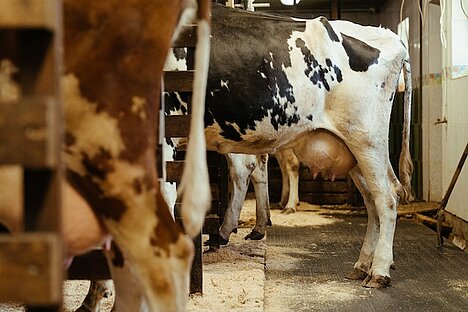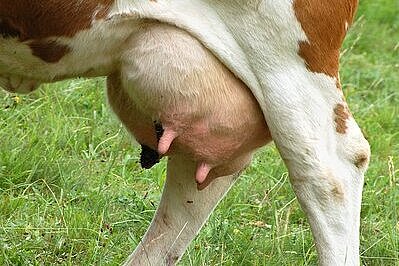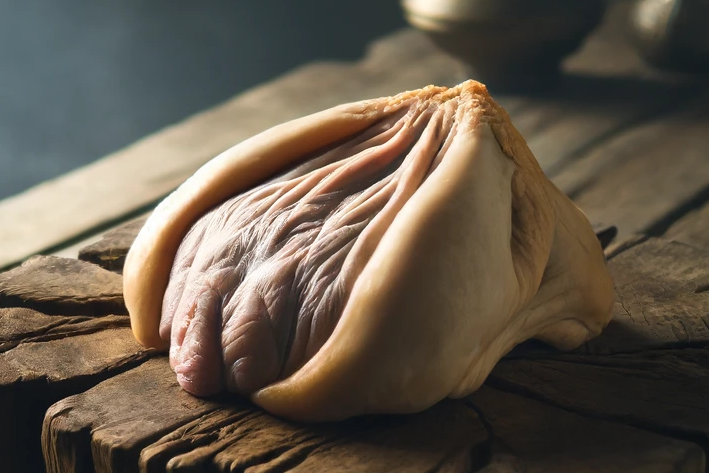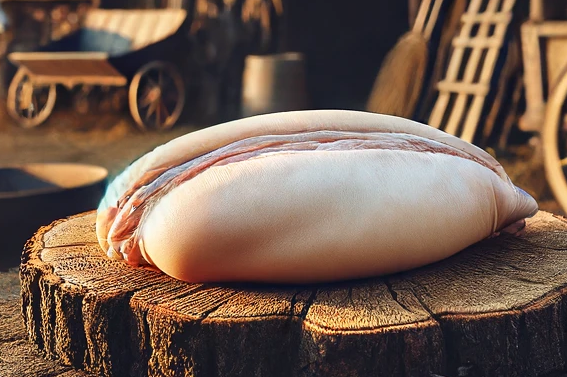Cattle udder

What is bovine udder?
Bovine udder is the cow's fourth stomach, which is responsible for the digestion of plant-based food. It contains many beneficial bacteria and enzymes that enable the fermentation of food. Beef udder is very rich in protein and has a high fat content, which can vary depending on its origin and processing. Beef udder is usually offered dried or frozen to extend its shelf life and improve its consistency.
What are the benefits of beef udder for dogs?
Beef udder has many positive effects on your dog's health and well-being. Here are some of them:
- Beef udder is a natural source of high quality protein, which is important for muscle building, cell regeneration and the immune system.
- Beef udder is rich in fat, which provides energy and nourishes the skin and coat. Fat is also important for the absorption of fat-soluble vitamins such as A, D, E and K.
- Beef udder contains calcium, which ensures strong bones and teeth. Calcium is particularly important for puppies, young dogs, pregnant or lactating bitches and older dogs.
- Beef udder aids digestion as it contains probiotic bacteria and enzymes that support the intestinal flora and improve nutrient absorption.
- Beef udder is an ideal chewy snack that satisfies your dog's natural urge to chew and promotes teeth cleaning. Chewing reduces plaque and tartar and massages the gums.
- Beef udder is a tasty snack that will give your dog a lot of pleasure and stimulate his taste buds.
What are the disadvantages of beef udder for dogs?
Although beef udder is a healthy snack for dogs, it is not without risks. Here are some possible disadvantages you should be aware of:
- Beef udder can lead to obesity if fed too often or in too large quantities. The high fat content can also lead to digestive problems such as diarrhea or bloating, especially in sensitive or overweight dogs.
- Beef udder can trigger allergies or intolerances if your dog has a milk or meat allergy or reacts to certain ingredients. Therefore, watch out for possible symptoms such as itching, skin rash or vomiting and consult a vet if in doubt.
- Beef udder can contain germs or parasites if it has not been sufficiently heated or dried. This can lead to infections or diseases that can also be transmitted to humans. Therefore, ensure good hygiene when handling the product and only buy from trustworthy sources.
- Beef udder can cause injuries if your dog eats it too quickly or too greedily or if it is too hard or too sharp-edged. This can lead to cuts, broken teeth or choking. Therefore, make sure that your dog always eats under supervision and that you choose the right size and consistency for your dog.
How to feed beef udder correctly?
Beef udder is a snack and not a complete food for dogs. It should therefore only be fed as a supplement to a balanced diet. Here are some tips on how to feed beef udder correctly:
- Feed beef udder only in moderation and adjust the amount according to your dog's age, size, activity level and health status. As a rule of thumb, beef udder should not make up more than 10% of your dog's daily calorie intake.
- Only feed beef udder as a reward or activity and not as a main meal. Only give your dog beef udder after eating or between meals so as not to spoil his appetite.
- Only feed beef udders in a suitable condition and in a suitable place. Store beef udder in a cool, dry place and avoid leaving it in the sun or heat for too long. Only give your dog beef udder on a clean surface or in a bowl and remove it if it becomes dirty or damp.
- Only feed beef udder under supervision and with care. Watch your dog eat and look out for any signs of intolerance, overeating or injury. Take the udder away from him if he can no longer chew it or if he tries to swallow it.
Where can you buy beef udder?
You can buy beef udders in many specialist pet stores, online stores or directly from the butcher. Pay attention to the following criteria:
- The origin of the product: only buy beef udders from controlled, species-appropriate and sustainable animal husbandry. Avoid products from factory farming, hormone treatment or the use of antibiotics.
- The processing of the product: only buy beef udders without added chemicals, preservatives or colorants. Avoid products with artificial flavors, sugar or salt.
- The quality of the product: Only buy beef udders with a fresh, pleasant smell and a natural color. Avoid products with a rancid, unpleasant smell or an unnatural color.
Beef udder is a natural and tasty chewy snack for dogs that offers many benefits for the health and well-being of your four-legged friend. It is rich in protein, fat and calcium and promotes digestion and teeth cleaning. However, it should only be fed in moderation and under supervision to avoid possible disadvantages such as obesity, allergies, infections or injuries. Also make sure that the product is of good origin, processing and quality in order to achieve the best possible effect.
Properties 6
Are you looking for other ingredients with a specific property?
Just click on them to find more.
If you notice any signs of hypersensitivity or poisoning in your dog, you should see your vet immediately. We are not a substitute for a vet, but we try to be as accurate as possible. Every dog reacts differently and we recommend you get a second opinion or consult your vet if in doubt.
Stay healthy and take good care of your four-legged friend!😊
Similar to Cattle udder
One of the biggest advantages of udder as dog food is that it is very cheap. As it is a slaughterhouse offal, it is often offered at a low price. Udder is also very tasty for dogs, who like to chew...
Camel udder is, as the name suggests, the udder tissue of camels. As with other mammals, the udder is used to produce milk for the rearing of offspring. Camel udder is used as a food source for...
Sheep udder is part of the female reproductive system of sheep and belongs to the offal or viscera category. It is traditionally used in the human diet in various cultures around the world, but its...
Goat udder, a by-product of goat milk production, is the udder of a goat from which milk is obtained. After a goat is no longer producing milk, its udder can be used as a source of meat. Although...



